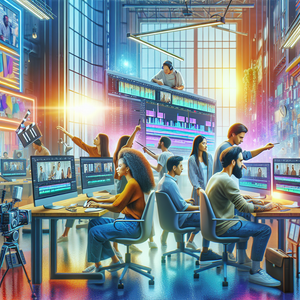
Discover Your Path: 20 Exciting Career Opportunities for Aspiring Copy Editors and Freelancers
Choosing a career as a copy editor or freelance editor can lead to a fulfilling and dynamic professional life. While having a degree in English, journalism, or a related field can provide a solid starting point, it is not strictly necessary for success in this field. Industry experts highlight the significance of cultivating a strong portfolio, gaining hands-on experience, and honing editing skills across various formats. Carving out a niche in areas like technical or creative editing can greatly increase your appeal in the job market. Networking through platforms like Upwork and engaging with professional organizations is also vital for client acquisition. This article delves into 20 diverse roles within the editing landscape, outlining their requirements, responsibilities, and how they can propel your career in this ever-evolving industry.
Job Summaries:
Freelance Copy Editor:
- Freelance copy editors play a crucial role in polishing written content by rectifying grammar, punctuation, and stylistic inconsistencies to ensure clarity and coherence.
- Working with a range of clients—from authors to corporations—often under tight deadlines.
- This role demands excellent communication skills and meticulous attention to detail.
- Familiarity with various style guides is necessary.
- The development of a strong portfolio is essential for attracting clients.
Content Editor:
- Content editors manage the production of written works.
- They ensure that the works align with a publication’s voice and editorial standards.
- This involves proofreading and providing feedback on structure, tone, and overall readability.
- A background in journalism or communications is typically advantageous.
- An understanding of SEO principles is important to enhance article visibility and engagement.
Technical Editor:
- Technical editors specialize in editing complex documents such as manuals and academic papers.
- They ensure that the content is grammatically accurate and comprehensible for the intended audience.
- Often requiring a degree in a technical field, this role is vital in translating intricate information into accessible language.
- Particularly in specialized industries like IT and engineering.
Proofreader:
- Proofreaders meticulously review text for typographical errors, grammatical mistakes, and formatting issues.
- They focus solely on the final version of documents before publication.
- Their attention to detail and understanding of grammar rules is critical in maintaining the integrity of published works.
Book Editor:
- Book editors collaborate closely with authors to transform manuscripts into publishable pieces.
- This includes developmental editing, where they provide insights on plot and character development, in addition to copy editing for grammar and clarity.
- A background in literature or creative writing is beneficial, as are interpersonal skills to guide authors through the editing process.
Substantive Editor:
- Substantive editors make significant alterations to content and structure to improve clarity and flow.
- A strong grasp of narrative techniques and detail orientation is essential.
- Often requiring a degree in English or a related field.
- Their contributions can turn a rough draft into a polished final product.
Digital Content Editor:
- Digital content editors oversee online publications.
- Ensuring that articles capture readers’ attention while being optimized for web audiences.
- This role demands a blend of editing skills with an understanding of digital marketing and SEO.
- Making it crucial for driving traffic and enhancing reader engagement.
Academic Editor:
- Academic editors help researchers prepare articles for publication in scholarly journals.
- They focus on clarity and adherence to citation styles.
- A strong academic background, often with an advanced degree, is necessary.
- Their role is pivotal in helping scholars communicate their findings effectively.
Journalism Editor:
- Journalism editors supervise the editorial process for news articles.
- They ensure factual accuracy and adherence to journalistic ethics.
- A solid understanding of current events is essential.
- Strong writing skills are essential for journalism editors.
- They play a key role in delivering timely and accurate information to the public.
Marketing Copy Editor:
- Marketing copy editors create compelling marketing materials, including advertisements and website content.
- This role requires persuasive writing skills and an understanding of branding, ensuring messaging is both clear and effective.
Creative Editor:
- Creative editors engage with artistic content, such as fiction and poetry, assisting authors in refining their voice and enhancing narrative depth.
- A solid foundation in literature and creative writing is often necessary to provide meaningful insights.
Social Media Editor:
- Social media editors craft and manage content across various platforms.
- They require strong writing abilities and a pulse on social media trends.
- Their work is essential in engaging audiences.
- They help maintain a consistent brand voice in today’s digital landscape.
Grant Editor:
- Grant editors support organizations in drafting and refining grant proposals.
- They ensure clarity and adherence to specific guidelines.
- A background in nonprofit management or grant writing can be beneficial.
- Their work helps secure funding for meaningful projects.
Script Editor:
- Script editors in the film and television industry focus on developing and refining scripts.
- Feedback on dialogue, character development, and overall structure is crucial.
- Often necessitating a background in screenwriting or film studies.
Lifestyle Editor:
- Lifestyle editors curate content on topics like health, travel, and fashion.
- A keen awareness of trends and the ability to create relatable content is vital in shaping lifestyle narratives that resonate with readers.
Corporate Editor:
- Corporate editors manage communication for businesses, ensuring clarity and professionalism in various documents.
- This role often involves editing reports and presentations, safeguarding the integrity of the company’s messaging.
Web Content Editor:
- Web content editors are responsible for creating and editing website content.
- Familiarity with content management systems and SEO practices is essential.
- Strong writing skills help produce engaging content.
- Engaging content enhances user experience and visibility.
Advertising Copy Editor:
- Advertising copy editors ensure that marketing materials are not only grammatically correct but also persuasive.
- Understanding marketing principles and consumer psychology is crucial for shaping effective advertising strategies.
Speech Editor:
- Speech editors assist individuals in refining their speeches for clarity and impact.
- Strong writing skills and an understanding of public speaking dynamics are necessary to enhance the speaker's delivery.
Video Content Editor:
- Video content editors work alongside producers to edit scripts and captions for video productions.
- Skills in editing and visual storytelling are key to creating engaging content that captivates audiences.
The editing industry is rich with diverse career opportunities suited to various interests and skill sets. Each role contributes uniquely to the field, and as the demand for quality content continues to rise, so too do the prospects for aspiring editors. By exploring current job openings and focusing on the skills and specializations that resonate with you, you can carve out a fulfilling career path. Remember to incorporate insights, case studies, and professional advice to enrich your understanding of the editing landscape. With determination and a clear vision, you can unlock the potential of your future in this vibrant industry!
Explore More Jobs

